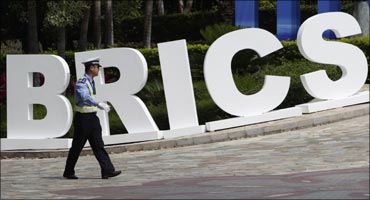 The formation of the New Development Bank by the Brazil Russia India China South Africa nations along with the formation of the Asian Infrastructure Investment Bank will break the monopoly of the International Monetary Fund and World Bank and make their functioning more democratic, a state-run Chinese think tank has said.
The formation of the New Development Bank by the Brazil Russia India China South Africa nations along with the formation of the Asian Infrastructure Investment Bank will break the monopoly of the International Monetary Fund and World Bank and make their functioning more democratic, a state-run Chinese think tank has said.
"All the Brazil, Russia, India, China and South Africa economies have become founding members of the AIIB, while China, India and Russia turned out to be the three largest shareholders of the bank," an article titled ‘BRICS cooperation helps to build new international framework’ published in the Global Times daily said.
"The establishment of the BRICS New Development Bank, an emergency reserve fund, and the AIIB will break the monopoly position of the International Money Fund and the World Bank," said the article written by Liu Zengyi, research fellow of Shanghai Institutes for International Studies.
"It will motivate the IMF and the WB to function more normatively, democratically, and efficiently, in order to promote the reform of international financial system as well as democratisation of international relations, it said.
A characteristic of this year's BRICS summit at Ufa was the economic and trade cooperation, especially the collaboration of development strategy among the BRICS members.
The meeting endorsed the Russia-initiated BRICS Strategic Economic Partnership, which provided a blueprint for the organisation's economic and trade cooperation in the coming years, said the article.
The initiative will push each economy to advance toward the goal of ‘setting up deep integration of markets, multi-level communication, efficient network of land, sea and air passages, and closer cultural exchanges,’ it said.
During the summit last week, the BRICS countries conducted dialogues with the Shanghai Cooperation Organization and the Eurasian Economic Union, in which each side discussed the expansion of exchanges in politics, economy and culture, it said.
China and Russia have reached an agreement over connecting the Beijing-led ‘One Belt, One Road’ initiative and the EAEU.
"It is a coincidence for the summits of BRICS and SCO to come together in the same city and at the same time.
“But it showed that the BRICS countries and Eurasian nations are eager to build a new framework of international politics, economy and security, with more democracy, equality, openness and inclusiveness," it said.
While the BRICS group mainly focuses on economic cooperation, the SCO was established primarily for mechanism of security cooperation, it said.
"Regional stability is the basis of the economic collaboration, while the latter can boost the development of the former.
"In light of this, both the BRICS and the SCO will jointly and effectively promote stability and prosperity in Asia and the entire world," the article said.










